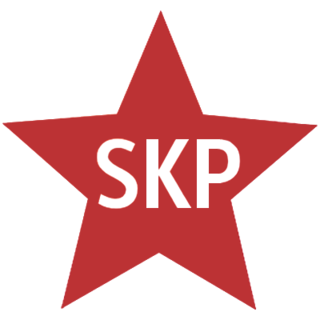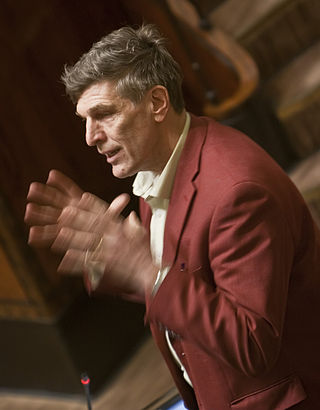
The Christian Democrats is a Christian-democratic political party in Finland.

The Centre Party, officially the Centre Party of Finland, is an agrarian-centrist political party in Finland. Ideologically, the Centre Party is positioned in the centre of the political spectrum. It has been described as liberal, social-liberal, liberal-conservative, and conservative-liberal. The party’s leader is Antti Kaikkonen, who was elected in June 2024 to succeed former minister Annika Saarikko. As of June 2023, the party has been a part of the parliamentary opposition.
Socialist Workers' Party was a political party in Finland. The STP was founded in 1973 as split from Social Democratic Union of Workers and Smallholders (TPSL). STP emerged from a group that did not approve of the return of TPSL to the Social Democratic Party.

Communist Workers' Party – For Peace and Socialism is a communist party in Finland. It was founded in 1988 to secure the existence of an independent Marxist–Leninist party. Since it was founded, it has been re-registered and subsequently de-registered multiple times. Since its founding, it has failed to gain any seats in the Parliament of Finland. The party has been de-registered since 2019.

The Communist Party of Finland (Finnish: Suomen Kommunistinen Puolue, abbr. SKP; Swedish: Finlands kommunistiska parti, abbr. FKP) or New Communist Party of Finland (Finnish: Uusi Suomen Kommunistinen Puolue, abbr. USKP; Swedish: Finlands nya kommunistiska parti, abbr. FNKP) is a political party in Finland. It was founded in the mid-1980s as Communist Party of Finland (Unity) (Finnish: Suomen Kommunistinen Puolue (yhtenäisyys), abbr. SKPy; Swedish: Finlands kommunistiska parti (enhet), abbr. FKP(e)) by the former opposition of the old Communist Party of Finland (1918–1992). SKP has never been represented in the Parliament of Finland, but the party has had local councillors in some municipalities, including the city councils of major cities such as Helsinki and Tampere. SKP claims 2,500 members.

The 1992 Italian general election was held on 5 and 6 April 1992. They were the first without the traditionally second most important political force in Italian politics, the Italian Communist Party (PCI), which had been disbanded in 1991. Most of its members split between the more democratic socialist-oriented Democratic Party of the Left (PDS), while a minority who did not want to renounce the communist tradition became the Communist Refoundation Party (PRC); between them, they gained around 4% less than what the already declining PCI had obtained in the 1987 Italian general election, despite PRC absorbing the disbanded Proletarian Democracy (DP).

House of Councillors elections were held in Japan on 29 July 2001. They were the first national elections since Junichiro Koizumi became Prime Minister after Yoshiro Mori resigned in April 2001. The Liberal Democratic Party (LDP) and its election allies, were the major winner, provided Koizumi a strong mandates to move forward with his reform policies. The ruling coalition performed well, and regain their majority in the House of Councillors.
Workers' Party of Finland was a left-wing political party in Finland. The STP was founded in 2006 as a successor to the Alternative League (1999–2006).
Taistoism was an orthodox pro-Soviet tendency in the mostly Eurocommunist Finnish communist movement in the 1970s and 1980s. The Taistoists were an interior opposition group in the Communist Party of Finland. They were named after their leader Taisto Sinisalo, whose first name means "a battle", "a fight" or "a struggle". Sinisalo's supporters constituted a party within a party, but pressure from the Communist Party of the Soviet Union prevented the party from formally splitting. The term taistolaisuus was a derogatory nickname invented by Helsingin Sanomat and was never used by the group themselves. In colloquial Finnish, taistolainen is the same as Tankie in English.

Esko-Juhani Tennilä was a Finnish leftist politician from Lapland and member of Parliament since 1975 until 2011.
Women's Democratic Action Centre was the women's wing of the leftist party Democratic Alternative (Deva) in Finland 1987-1990. The organisation emerged of a split in the Democratic Women's League of Finland (SNDL) in the spring of 1986, as six SNDL districts sided with Deva. SNDL expelled its rebel districts in November 1986.
Socialist Workers' Party of Finland was a Finnish political party in the early 1920s. The SSTP consisted of radical leftists who split from the Social Democratic Party of Finland after the Finnish Civil War of 1918. The banned Communist Party of Finland (SKP) was the main force behind the party but other socialists were also involved. The SSTP was banned in 1923 and its leading members, including 27 members of parliament, were jailed. The party was succeeded by the Socialist Electoral Organisation of Workers and Smallholders (1924–1930).

The Socialist Party is a centre-left to left-wing political party in France. It holds social democratic and pro-European views. The PS was for decades the largest party of the "French Left" and used to be one of the two major political parties under the Fifth Republic, along with the Rally for the Republic in the late 20th century, and with the Union for a Popular Movement in the early 2000s. It is currently led by First Secretary Olivier Faure. The PS is a member of the Party of European Socialists, Progressive Alliance and Socialist International.
The League of Socialist Youth of Bosnia and Herzegovina was a youth organization in the Socialist Republic of Bosnia and Herzegovina. SSOBiH traced its roots to the youth resistance movements during World War II, and became the main youth organization in the republic during the Tito era. During the 1980s, SSOBiH became increasingly autonomous from the party line and eventually became a political party of its own. It was succeeded by the Liberal Democratic Party.

Nienburg II – Schaumburg is an electoral constituency represented in the Bundestag. It elects one member via first-past-the-post voting. Under the current constituency numbering system, it is designated as constituency 40. It is located in central Lower Saxony, comprising the district of Schaumburg and most of the district of Nienburg.
Seppo Esko Tapani Toiviainen was a Finnish social psychologist and politician. He was a Member of the Parliament of Finland, representing the Finnish People's Democratic League (SKDL) from 1979 to 1986 and the Democratic Alternative (DEVA) from 1986 to 1987. He was also active in the Communist Party of Finland (SKP).

Jouko Kajanoja is a Finnish economist and politician who served as minister of labour between 1981 and 1982. He was a member of the Communist Party which he headed from 1982 to 1984.

Marja-Liisa Löyttyjärvi is a Finnish engineer and socialist politician. She served at the Parliament from 1979 to 1991 for various leftist political parties. She also headed the now-defunct Democratic Alternative until 1990.











